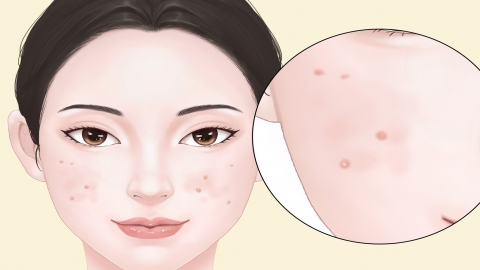How to remove acne scars
Acne scars may be caused by age factors, skin type, improper squeezing, skin infections, acne, and other factors, and can be removed according to different situations. It is recommended to visit a hospital promptly to determine the skin condition and follow medical advice for treatment.

1. Genetic predisposition: Genetic factors affect skin structure and healing ability. If family members tend to develop acne scars, an individual may have similar skin characteristics. For acne scars with a genetic predisposition, follow medical advice to use methods such as microneedling, chemical peels, and laser therapy to promote skin regeneration and improve the appearance of acne scars.
2. Skin type: Oily skin and thick stratum corneum types tend to accumulate sebum and dead skin cells that clog pores, triggering inflammatory reactions and increasing the risk of acne scars after healing. Daily skincare should focus on cleansing and oil control, using products such as salicylic acid cleansers and fruit acid peels to help improve skin elasticity.
3. Improper squeezing: Squeezing acne can cause infection to spread. Pressure may push inflammatory substances and bacteria into deeper layers of the skin, causing a broader inflammatory response, damaging the skin structure, and forming acne scars. It is recommended to avoid squeezing acne and use gentle cleansers to clean the skin, avoiding the use of irritating cosmetics.
4. Skin infection: Skin infections, such as Staphylococcus aureus infection, can lead to deep tissue damage, resulting in acne scars after healing. The infected area may be accompanied by symptoms such as redness, swelling, heat, pain, and pus discharge. Follow medical advice to use medications such as mupirocin ointment, amoxicillin capsules, and cefaclor dispersible tablets for improvement.
5. Acne: Acne may be related to infection, causing a strong inflammatory response that damages collagen in the dermis layer, forming acne scars during the healing process, accompanied by symptoms such as redness, pain, and pustules. Patients can follow medical advice to use medications such as clindamycin gel, isotretinoin soft capsules, and erythromycin ointment for improvement.
Removing acne scars requires selecting appropriate methods based on individual circumstances. Before undergoing any treatment, it is recommended to first consult the opinion of a professional doctor or dermatologist. At the same time, maintaining good skincare habits and lifestyle choices can also help prevent the formation of acne scars.






